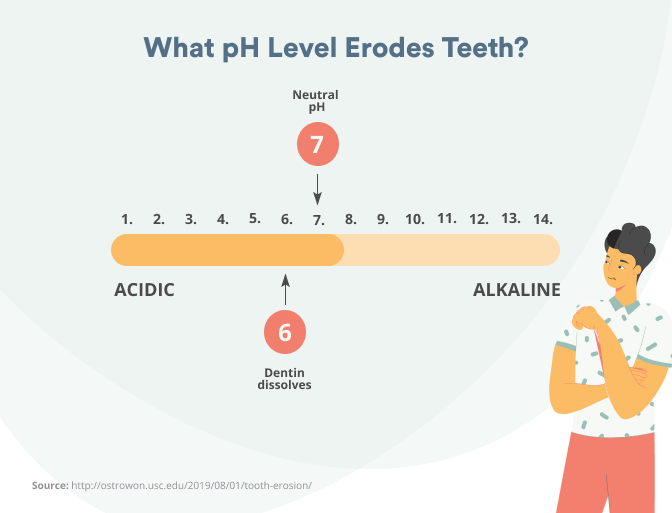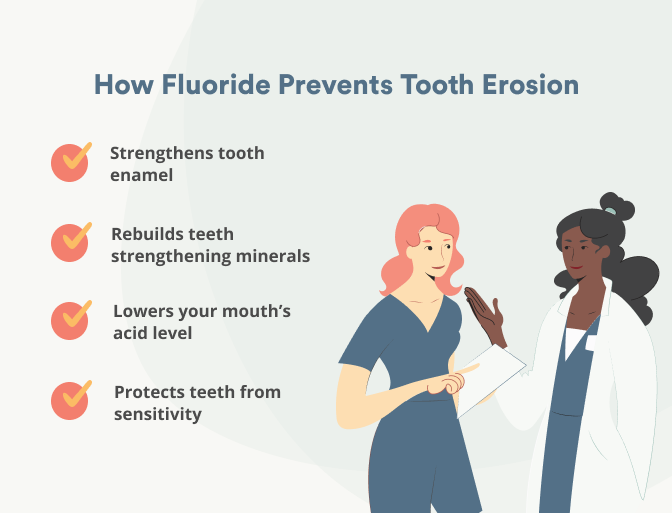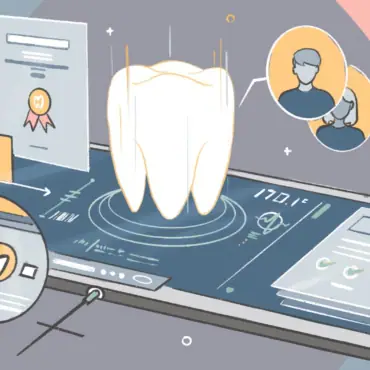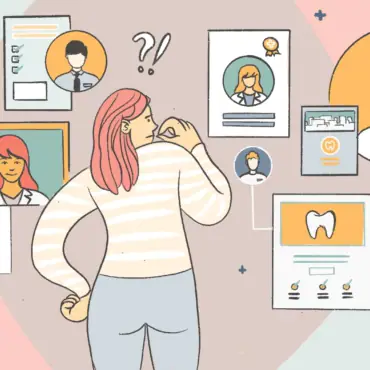Your teeth’s enamel, the thin outer covering, is your first line of defence against tooth erosion. This translucent barrier helps protect from daily chewing, crunching, grinding, as well as changes in temperature or acidic chemicals.
Protecting those pearly whites is hard work so your enamel is prone to wear and tear. We refer to this damage as enamel erosion or tooth erosion (not to be confused with tooth decay). It affects the aesthetic appearance of your teeth, but more importantly, can cause significant dental complications. To avoid these complications, it’s essential to know the symptoms, causes, treatments, and prevention methods for tooth erosion.
Tooth Erosion Symptoms
The signs of tooth erosion vary depending on the stage. A dentist will likely notice the first signs of erosion. Typically the back surfaces of your front teeth are the first to be affected. Your dentist may observe a light yellow patch on a tooth where enamel has dissolved and exposed the dentine underneath.
Symptoms you may notice include (but aren’t limited to):
- Sensitivity to temperatures or sweets
- Yellowish discoloration
- Cracked or chipped teeth
- “Cupping” (indentations on your teeth’s surface)
- Grooves on your teeth’s surface
- Teeth appearing more rounded, especially your canines and incisors.
- Shiny or see-through spots on teeth
Causes of Tooth Erosion
While tooth erosion may be slightly hereditary, and baby’s teeth can be affected by a mother’s nutritional habits, most cases of tooth erosion are a result of lifestyle choices. You get tooth erosion when acid wears away the enamel on your teeth. Your mouth can become overly acidic for a variety of reasons.
Due for a checkup?
Find a top rated dentist near you that takes your insurance.
Stomach acids
People with acid reflux, intense morning sickness, and gastrointestinal problems have more acidic mouths. Any time you vomit, acid rises into your mouth and erodes tooth enamel. The eating disorder bulimia as well as alcoholism both involve frequent vomiting and can cause tooth erosion. One study shows that 92% of 37 patients who suffered from alcoholism had dental erosion.
Beverages
Dental erosion for alcoholics is even worse for those who consume highly acidic drinks. A neutral pH value is 7.0 and dentin dissolves at pH 6.0 so it’s recommended to try and not allow the levels in your mouth to frequently drop below 5.5.
Juices and sodas are very acidic and usually have a pH value between 2.0 to 3.5. Frequent consumption increases your risk of dental erosion, especially soda which is about ten times worse for tooth enamel compared to fruit juice. When you reach for that sports drink, keep in mind that even though the flavour might not seem overly sweet, they beverage is also acidic. Sadly, wine is also a tooth erosion culprit. Cheers?

Protect that enamel by limiting consumption of juices and sodas especially, citrus-flavored, sour, or carbonated beverages as the fizz of carbonation raises the acidity level of any drink.
Sugar and other harmful ingredients
Although sugar alone isn’t highly acidic, it encourages the growth of acid-creating bacteria in your mouth, and shouldn’t be eaten too often. A considerable amount of candy is marketed to kids and teens, so it should come as no surprise that in a study of 900 middle school students, around 30% showed signs of dental erosion.
Other studies show up to 41% of kids in the United States, between ages 11-13, have enamel erosion. For foods, check labels to see if food acids have been added. Watch out for food acids 330 (citric acid), 331 (sodium citrate), and 338 (phosphoric acid) in particular.
Medications
Certain medicines, such as aspirin, antihistamines, or vitamin C tablets, can also erode your teeth. Additionally, bacteria in plaque can change food starches into acids that wear down tooth enamel. Your saliva naturally dilutes erosive acid and protects enamel by coating your teeth with calcium and other minerals. However, if you have dry mouth or xerostomia (low salivary flow) your teeth are less protected and may erode easier.
Grinding and physical force
Grinding your teeth increases your likelihood of tooth erosion and the same applies if you clench your teeth often or use them roughly — like using your teeth to open wrappers or bottles. Where you work and spend your time can be a factor too. People who work in factories, such as munitions, battery, and fertilizer plants are more likely to develop dental erosion. Chlorinated water has a low pH, so swimmers who are in the water for hours each day may also have issues.
Tooth Erosion Treatment
To diagnose tooth erosion you’ll need to book an appointment with your dentist. Before deciding on a treatment, your dentist will determine the following:
- Are there signs of regurgitation or reflux?
- Has the patient reported ingesting acidic foods or drinks?
- How severe is the erosion?
Disease treatment
If you suffer from bulimia or alcoholism, it may be uncomfortable to mention this to your dentist. However, knowing the cause of your tooth erosion is useful information that can inform treatment decisions. So if you can, be honest. According to the National Eating Disorder Association, 89% of people with bulimia show signs of the disease in their mouths. Dentists are instructed to be non-judgmental when discussing eating disorder concerns and should you need it, some dentists can recommend therapists. Either way, your dentist can teach you how to reduce the adverse oral effects of purging.
Due for a checkup?
Find a top rated dentist near you that takes your insurance.
Unfortunately, tooth erosion isn’t reversible as is enamel loss. Treatment options will depend on the cause of erosion as well as the severity of the problem. If there is an underlying disease or medical disorder, that problem will need to be fixed to prevent further erosion. If you have damage, you may need to cut down on acidic foods and beverages, or switch to using straws.
Daily habit changes
You might also be asked to decrease abrasiveness on your teeth by brushing more gently, waiting to brush your teeth after acidic foods or drinks (because your teeth are weaker), and rinsing your mouth with water after eating and drinking. Increasing your dairy intake, or taking antacid tablets, may also be useful. Using fluoride, whether in the form of gels, varnishes, tablets, or mouth rinses, can also help protect your teeth.
Tooth bonding or veneers
Other treatments include tooth bonding which uses a tooth-colored composite resin, to protect eroded teeth and improve the cosmetic appearance. For severe enamel erosion, a dentist might cover a tooth with a crown or veneer to protect it from further decay. One study that used ultra-thin occlusal veneers for erosion treatment found that it completely rehabilitated mouths. But, as always, prevention is the best treatment.
Tooth Erosion Prevention
Fluoride is your friend
There are many ways you can prevent enamel loss. In addition to standard methods for keeping your teeth healthy, such as brushing and flossing, make sure to incorporate fluoride into your routine. Fluoride strengthens your teeth. Most kinds of toothpastes include fluoride and it can also be found in some mouthwashes and supplements. Tap water often contains fluoride as well.

Just remember that it is possible to get too much fluoride. If you ingest excess fluoride, you can develop enamel fluorosis. With this disorder, your teeth become discolored and sometimes damaged. To avoid dental fluorosis, make sure not to swallow fluoride toothpaste.
Got calcium?
When your teeth are exposed to acid, it leaches calcium from your enamel. Increasing your calcium intake can help you build strong teeth that are less susceptible to erosion.
Sip through straws
Another way to help prevent tooth erosion is to use straws when you drink acidic drinks. Straws allow the liquid to surpass your teeth and go straight to your throat. There are many alternatives to plastic straws for people who worry about the environmental impact.
Chew sugar-free gum
Even with straws, it’s recommended to reduce the amount of acidic foods and beverages in your diet and rinse your mouth with water afterward. Chewing sugar-free gum between meals can boost your saliva production levels up to ten times your normal flow and can also remove up to 95% of residual food debris in just a few minutes. Try to get gum containing xylitol, which has been shown to reduce acids. Drinking extra water throughout the day, especially if your mouth is dry, can also increase saliva levels.
See you dentist
Get dental check ups regularly. Your dentist can detect early signs of tooth erosion and take speedy action to improve the situation if necessary. If you think you’re at risk for enamel erosion, ask your dentist if sealants might help as a prevention method. The bad news is that enamel erosion isn’t reversible. The good news is that it is preventable and there are treatment options available. Your enamel protects your teeth from erosion, but it’s your job to protect the enamel.
Ready to Get Your Teeth Checked?
You need a dentist you trust to check your teeth for signs of erosion. If you’re looking for a highly qualified dentist, who is a great fit for your personality, sign up for Opencare today and find your match.
Due for a checkup?
Find a top rated dentist near you that takes your insurance.








